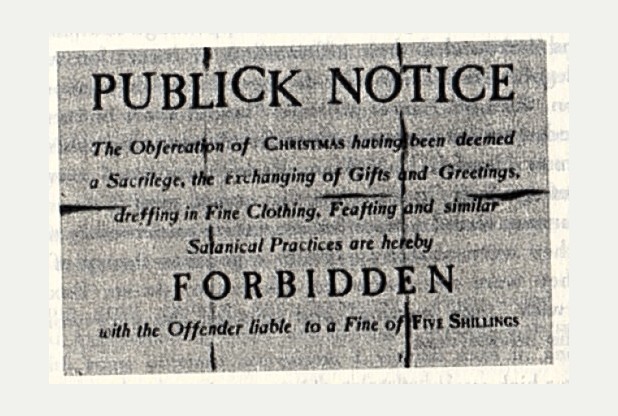When Christmas Was Legally Banned for 22 Years by the Puritans in Colonial Massachusetts
Complaints in regards to the commercial-age corruption of Christmas miss one critical truth: as a mass public celebration, the holiday is a somewhat current invention. Whether or not we credit Charles Dickens, Bing Crosby, or Frank Capra—males not against advertising and marketing—we should reckon with Christmas as a product of modernity. That features the sacred concepts about family, piety, and gratitude we connect to the oceanson.
The Puritans of the Massachusetts Bay Colony “despised Christmas,” notes Boing Boing. They associated it with debauchery: heavy drinking, gluttony, riots, “rowdiness and sinful behavior.” Not solely that, however they “noticed it as a false holiday with stronger ties to paganism than Christianity,” writes Rebecca Beatrice Brooks on the History of Massachusetts weblog, and “they had been correct, according to the ebook The Battle for Christmas.”
The History Dose video above informs us that in 1659, “the General Courtroom of Massachusetts made it illegal to celebrate Christmas.” Feasting, and even taking off work on December twenty fifth would lead to a effective of 5 shillings. It appears excessive, however the holiday had a automobilenivalesque reputation on the time. Not solely had been revelers, on the finish of a protracted yr’s work, wanting to benefit from the spoils of their labor, however their automobileoling may even flip right into a form of violent trick-or-treating.
“On some occasions the automobileolers would turn into rowdy and invade rich properties demanding foods and drinks,” Brooks writes. They “would vandalize the house if the personaler refused.” The Puritans’ writeritarian streak, and respect for the sanctity of private property, made canceling Christmas the one appearingly logical factor to do, with a ban finaling 22 years. In any case, explicit ban or no, spurning Christmas was common practice for 2 hundred years of New England’s colonial history.


Ultimately, for all its supposed intrusions into the snow globe of Christmas purism, “we are able to partially thank commercialization for sustaining the domestic model of Christmas now we have at the moment”—the model, that’s, that ensures we are able to’t cease discussing about, learning about, and listen toing about Christmas, whatever our beliefs, within the several weeks leading as much as December twenty fifth.
If you want to enroll in Open Tradition’s free e-mail newsletter, please discover it right here. Or follow our posts on Threads, Faceebook, BlueSky or Mastodon.
If you want to support the mission of Open Culture, consider making a donation to our website. It’s arduous to rely 100% on advertisements, and your contributions will assist us continue professionalviding one of the best free cultural and educational materials to be taughters eachthe place. You’ll be able to contribute by way of PayPal, Patreon, and Venmo (@openculture). Thanks!
Related Content:
Behold! The Very First Christmas Card (1843)
John Waters’ Hand-Made, Oddball Christmas Playing cards: 1964-Current
Watch Björk, Age 11, Learn a Christmas Nativity Story on an Icelandic TV Special (1976)
Langston Hughes’ Residencemade Christmas Playing cards From 1950
Josh Jones is a author and musician based mostly in Durham, NC. Follow him at @jdmagness.

